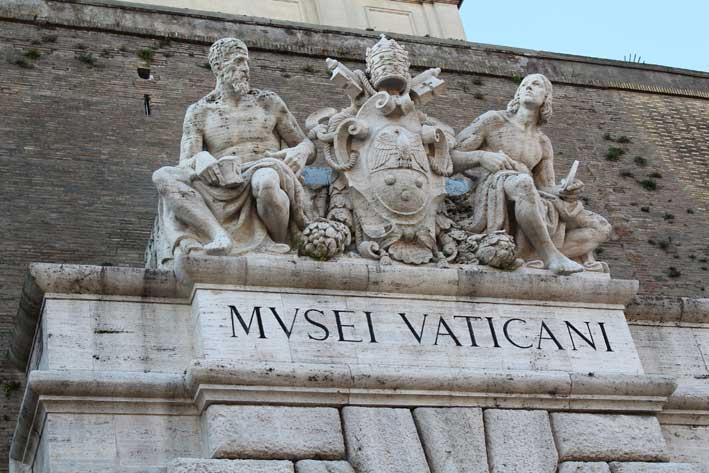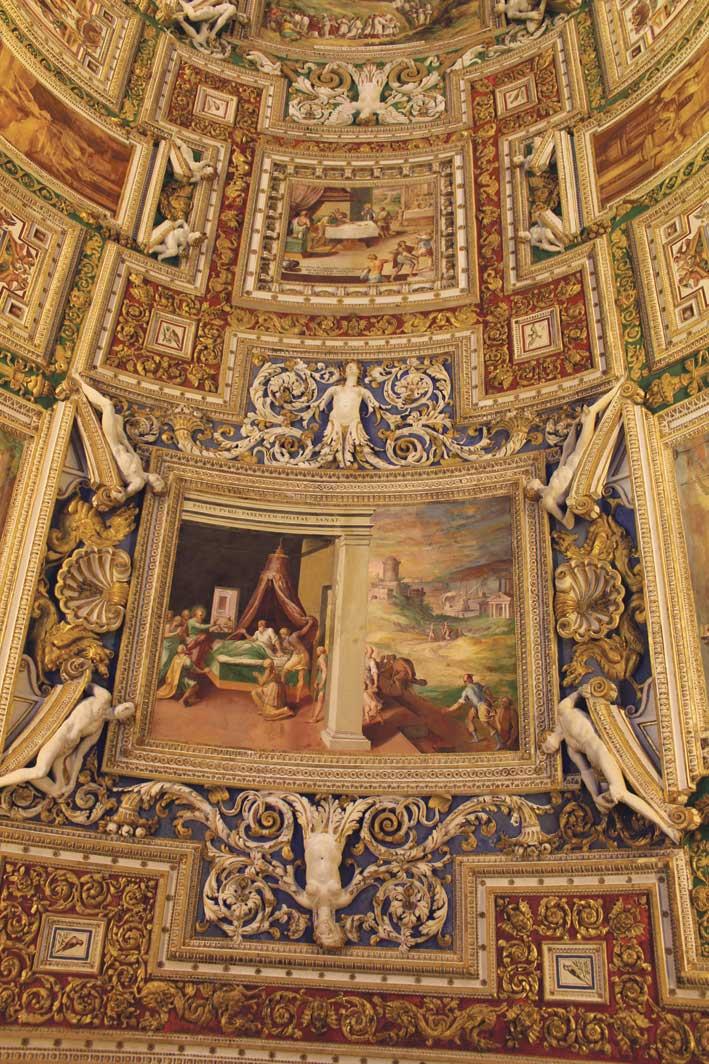Last week, my wife and I visited the Vatican Museum and the Sistine Chapel, in Rome. Along the tour I took hundreds of photos of many of the stunning and awe inspiring rich collection treasures that several Popes amassed during their papacy. Egyptian sarcophagi, Greek and Roman marble statues of all sizes, paintings, papal vestments' furniture, large murals with maps, priceless enormous Flemish tapestries [realized during the pontificate of Clement VII (1523-1534)] depicting biblical and profane episodes, precious colourful ceramic vases and works of art, ceilings with paintings embedded in geometrical sculptured designs, and old decorated and gilded sedans and cabs, and cars used by popes in different times - there was indeed much to see and appreciate.
I tried to capture and bring with me as much of a comprehensive record as I could.

Back in Malta, while going through the photographs, I enjoyed randomly enlarging some photos trying to appreciate better details which I could not stop to, while on the spot, in the large rooms and long halls crowded with other visitors around.
At one moment, while looking at an enlarged photo of part of the baroque ceiling of the very long hall with wall maps on each side, my eyes got fixed on a painting which I would have never noticed along the tour. Flanked by other small paintings, designs, and embellishments, in a gilded frame there was a scene above which the enlarged wording 'PAVLVS PUBLI PARENTEM MELITAE SANAT' could be read; it is a painting depicting St Paul 'healing' Publius' dysentery-afflicted father who is seen sitting in a bed, beneath a bed canopy, in a well-kept room, with a window in the wall at the back and a door on the right hand side overlooking the coast and sea. Publius is the man kneeling down beside, and looking up at Paul performing the healing. Other people in the room, look on. On the right hand side of the building, in the foreground, people are approaching the door to have a better view of the unfolding miracle. In the distance a ship at bay ... perhaps the one on which Saint Paul and the survivors from the shipwreck had to travel to Rome.
A 15th century codex
Incidentally, some twenty years ago, while doing research in the Biblioteca Nazionale Universitaria of Turin, I came across a codex with information about many islands, which recounted St Paul's shipwreck episode associated with 'Mytilene' (most probably confused with 'Malta'. In this account, it is stated that St Paul healed Publius' brother, not father, and Publius is described as the chief of the island.
The shipwreck
"Mytilene is the island which as some say is today called Mitellino; this does not match well with my opinion. It is situated in the Aegean sea, a part of the Adriatic sea; I do not believe Pliny thought so. Near this island there extends a certain elbow-shaped shore by name Bitalassus ...; here two stormy seas meet from either side. When the winds blow, approach to the island is difficult, because the waves break on the shore alternately.
"In that place the Alexandrine ship carrying the apostle Paul with seventy-six men on his way to Rome ran aground after having been tossed by storms on the peak of those billows. Through Paul's prayers all of them swam safely to this island; only the ship was lost. Dripping with sea-water they rested on the shore, and to warm themselves, first they struck a spark out of flint and made a fire with the dry leaves put around as fuel; they readily created flames from tinder.
"But it happened that a snake hidden in the stalks, while escaping from the heat, attacked Paul's hand as he pressed down little bundles of shrub twigs. Paul shook it off into the fire.
"In fact, the inhabitants who were on the spot, not oblivious of his human nature, thought that he would immediately become swollen and die there and then, as usual. They blamed Paul with words saying that he was guilty of some crime since he had escaped from the danger of the sea and met a beast's bite. Moreover, when they saw that he was unhurt and suffered no harm, they cried out: 'Unless God is here, he would have died.' He performed many miracles for those who came together to him, while he warned them that he was not a god, but he was called God's messenger. He healed especially Publius' brother who was suffering from fever, stomach haemorrhage, and burning intestinal pain; Publius was the chief of the island."

The original text
"Mitilene insula est que, ut quidam dicunt, hodie Metellino vocatur, quod mihi non bene congruit, in Egeo mari sita quod est pars Adriatici maris, licet Plinius videtur velle sitam esse in Asiatico mari, licet non credam. Prope hanc insulam extenditur quidam / litoris umbo nomine Bitalassus ubi duo maria ... ipsum hinc inde procellantia conveniunt ad quam insulam spirantibus ventis propter undas prorumpentes in litus seque inter se reciprocantes difficilis est accessus. Eo navis alexandrina, qua Paulus apostolus Romam veniens cum sex et septies decies hominibus vehebatur, acta procellis in vertiginem horum fluctuum incidit, qui omnes Pauli precibus sospites amissa navi pernatantes ad hanc insulam pervenere. Hi sale tabentes arctus in litore ponunt et primum silicis scintillam excudunt ignemque suscipiunt foliis circumque nutrimenti siccis impositis ut chalefiant rapiunt in fomite flammas. Pauli autem ad ignem, ut fit, stipantis quorundam sarmentorum fruticum fasciculos anguis in herba latens calore fugiens, manum invasit, quam in ignem excussit Paulus. Incole vero de more qui adherant, ipsius sanguinis naturam non ignari, illico intumescendum ac subito moriturum putantes, verbis Paulum increpavere, dicentes, ipsum reum criminis alicuius fore cum maris periculum evitaverit bellue morsum inciderit. Ceterum dum ipsum sospitem ac nil mali patientem aspicerent: Nisi Deus hic esset, obiisset, acclamabant et multis ad eum convenientibus plura fecit miracula premonens se non Deum, sed Dei nunctium appellari: febricitantem precipue Publii fratrem, insule principis, fluxum ventris et intestinorum excoriationem patientem, sanavit. ..."